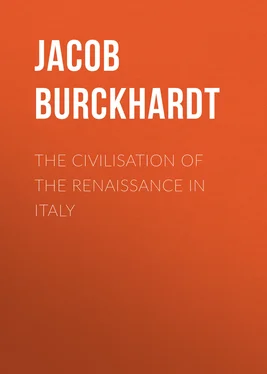Dr. Geiger doubts the absolute accuracy of Vespasiano Fiorentino’s catalogue of the library at Urbino. See the German edition, i. 313, 314. [S.G.C.M.]
Perhaps at the capture of Urbino by the troops of Cæsar Borgia. The existence of the manuscript has been doubted; but I cannot believe that Vespasiano would have spoken of the gnomic extracts from Menander, which do not amount to more than a couple of hundred verses, as ‘tutte le opere,’ nor have mentioned them in the list of comprehensive manuscripts, even though he had before him only our present Pindar and Sophocles. It is not inconceivable that this Menander may some day come to light.
[The catalogue of the library at Urbino (see foregoing note), which dates back to the fifteenth century, is not perfectly in accordance with Vespasiano’s report, and with the remarks of Dr. Burckhardt upon it. As an official document, it deserves greater credit than Vespasiano’s description, which, like most of his descriptions, cannot be acquitted of a certain inaccuracy in detail and tendency to over-colouring. In this catalogue no mention is made of the manuscript of Menander. Mai’s doubt as to its existence is therefore justified. Instead of ‘all the works of Pindar,’ we here find: ‘Pindaris Olimpia et Pithia.’ The catalogue makes no distinction between ancient and modern books, contains the works of Dante (among others, Comœdiæ Thusco Carmine ), and Boccaccio, in a very imperfect form; those of Petrarch, however, in all completeness. It may be added that this catalogue mentions many humanistic writings which have hitherto remained unknown and unprinted, that it contains collections of the privileges of the princes of Montefeltro, and carefully enumerates the dedications offered by translators or original writers to Federigo of Urbino.—L. G.]
For what follows and in part for what has gone before, see W. Wattenbach, Das Schriftwesen im Mittelalter , 2nd. ed. Leipzig, 1875, pp. 392 sqq., 405 sqq., 505. Comp. also the poem, De Officio Scribæ , of Phil. Beroaldus, who, however, is rather speaking of the public scrivener.
When Piero de’ Medici, at the death of Matthias Corvinus, the book-loving King of Hungary, declared that the ‘scrittori’ must now lower their charges, since they would otherwise find no further employment (Scil. except in Italy), he can only have meant the Greek copyists, as the caligraphists, to whom one might be tempted to refer his words, continued to be numerous throughout all Italy. Fabroni, Laurent. Magn. Adnot. 156 Comp. Adnot. 154.
Gaye, Carteggio , i. p. 164. A letter of the year 1455 under Calixtus III. The famous miniature Bible of Urbino is written by a Frenchman, a workman of Vespasiano’s. See D’Agincourt, La Peinture , tab. 78. On German copyists in Italy, see further G. Campori, Artisti Italiani e Stranieri negli Stati Estensi , Modena, 1855, p. 277, and Giornale di Erudizione Artistica , vol. ii. pp. 360 sqq. Wattenbach, Schriftwesen , 411, note 5. For German printers, see below.
Vespas. Fior. p. 335.












